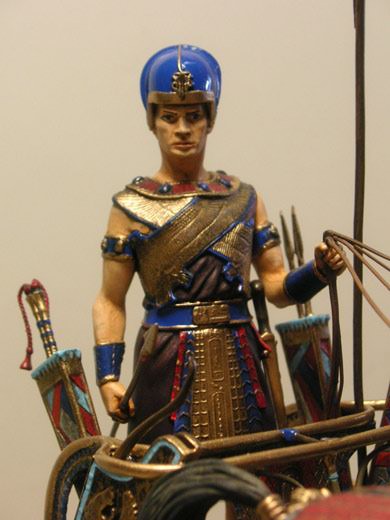
http://www.foxnews.com/images/242830/1_61_mummy_ramses.jpg
Excellent, just as I'm reading modern poetry we are starting into some of the classic poems. To start off, I feel the need to translate the poem into modern English.
I MET a Traveler from an antique land,
Who said, "Two vast and trunkless legs of stone
Stand in the desert. Near them, on the sand,
Half sunk, a shattered visage lies, whose frown,
And wrinkled lip, and sneer of cold command,
Tell that its sculptor well those passions read, (the sculptor saw the frown/wrinkled lip/cold sneer often on the face of the king)
Which yet survive, stamped on these lifeless things, (the expression/the hand that mocked still lives on through the dead stone)
The hand that mocked them and the heart that fed:
And on the pedestal these words appear:
"My name is OZYMANDIAS, King of Kings."
Look on my works ye Mighty, and despair!
No thing beside remains. Round the decay
Of that Colossal Wreck, boundless and bare,
The lone and level sands stretch far away.
This poem ends with an ironic image because his works are destroyed, nothing is left. This can serve as an example of "pride goes before the fall." It also demonstrates how temporary glory on Earth is. Man, is here one day and gone the next with little to commemorate "great" acts preformed in this life. I find these themes very interesting because they are also found in Mary Shelley's (Percy Shelley's wife) Frankenstein. Victor Frankenstein's works were nothing to him as he lost all he loved, and eventually dies because of his creation of the creature and the toll it took on him. His pride fueled the creation of it, prevented helping the thing once it was created, and prevented getting help in capturing it after it pledged to be an enemy of mankind.
 http://farm3.static.flickr.com/2444/3688743868_07f53fd3f8.jpg
http://farm3.static.flickr.com/2444/3688743868_07f53fd3f8.jpgI'm a very poor typist, so I looked up the poem's title for some copy/paste help. In the process I found this: http://www.potw.org/archive/potw46.html . According to the website Shelley and Horace Smith submitted similar sonnets to the magazine, The Examiner in 1818. Both of the poems were inspired by Diodorus Siculus. Smith's sonnet goes as follows:
Ozymandias.
IN Egypt's sandy silence, all alone,
Stands a gigantic Leg, which far off throws
The only shadow that the Desart knows:—
"I am great OZYMANDIAS," saith the stone,
"The King of Kings; this mighty City shows
"The wonders of my hand."— The City's gone,—
Nought but the Leg remaining to disclose
The site of this forgotten Babylon.
We wonder,—and some Hunter may express
Wonder like ours, when thro' the wilderness
Where London stood, holding the Wolf in chace,
He meets some fragment huge, and stops to guess
What powerful but unrecorded race
Once dwelt in that annihilated place.

http://www.modellversium.de/galerie/bilder/8/5/6/856-10265.jpg

No comments:
Post a Comment